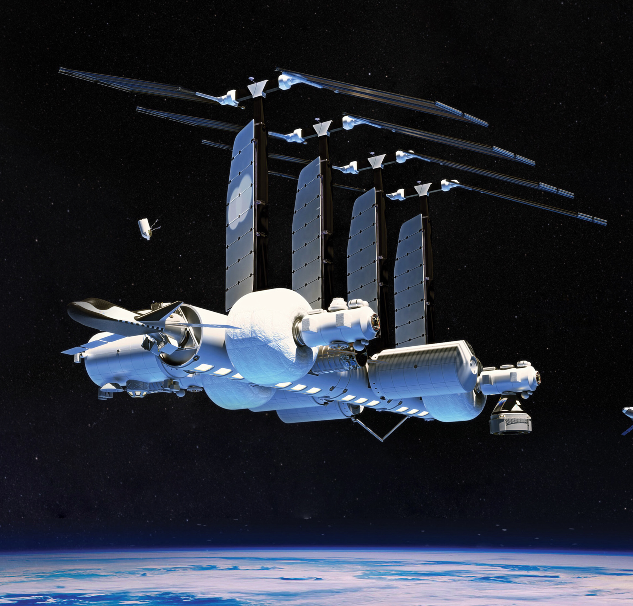
COLORADO SPRINGS—The Blue Origin and Sierra Space-led consortium developing the Orbital Reef commercial space station says it is on track to conduct the preliminary design review of the low Earth orbit (LEO) outpost in 2023 following completion of the systems requirements review.
The systems review, which was completed in three months, is a key milestone under the $130 million-funded Space Act Agreement that NASA awarded to the team as part of the agency’s Commercial Low Earth Orbit Destinations (CLDP) program.
The Orbital Reef team, which also includes Boeing, Redwire Space, Genesis Engineering Solutions, Amazon Distribution & Fulfillment Solutions, Amazon Web Services (AWS) and Arizona State University, is targeting initial operational capability in 2027.
“The systems review gives you enough level of detail so you can lay a design against it and start trading and doing your analyses,” says Scott Asbury, Sierra Space senior director of space destinations. “The system design review for release will be in July. That’s where you say, ‘I understand the requirements. How can I lay a design against it that’s producible and can be done on an achievable schedule’?
“From there we’ll move to the preliminary design review which is about a year away, and then critical design review the year after,” Asbury said, speaking to Aerospace DAILY on the sidelines of the Space Symposium here.
Sierra Space will provide its inflatable habitation module, known as the Large Integrated Flexible Environment (LIFE), and Dream Chaser spaceplane for cargo and crew transportation to Orbital Reef, Blue Origin and Sierra announced in October 2021. Blue Origin will provide its New Glenn launch vehicle to deliver the station’s core modules, which it is also slated to develop. Boeing, which will provide crew and cargo delivery with the CST-100 Starliner, is also developing a laboratory module for the Reef and will oversee station operations based on its International Space Station (ISS) experience.
Redwire will focus on microgravity research, development and manufacturing, payload operations and deployable systems.
Arizona State University is leading an international university consortium to build new communities of space researchers, while Maryland-based Genesis Engineering Solutions is developing a single-person spacecraft that can be used for extravehicular excursions.
Amazon will provide logistics and supply chain management to help Orbital Reef develop, launch and build up infrastructure to support operations and station occupants. Sister company AWS will provide integrated cloud services and tools to support space station development and design, flight operations and data management, as well as integrated networking, logistics, and communications.
“You’re used to getting packages really quickly, and sometimes it seems that the company knows what you want before you realize it,” says Gulu Gambhir, AWS director. “We aim to bring that same type of artificial intelligence and that level of automation that Amazon has perfected—as well as its worldwide operations—to space.”
